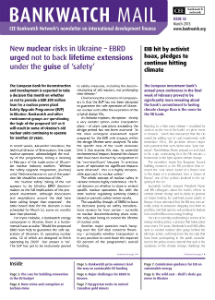Europe’s public banks disburse EUR 650 million to Sostanj coal plant despite ongoing corruption charges
Press release | 8 March, 2013Ljubljana – The European Investment Bank announced today [1] that it would pay the remaining EUR 440 million out of a EUR 550 million loan [2] for the construction of a new 600 megawatt lignite unit at Sostanj [3] in Slovenia, and that the European Bank for Reconstruction and Development would follow suite with its parallel EUR 100 million loan.
Read moreBankwatch Mail 55
Publication | 7 March, 2013On the occasion of the Climate Parliament meeting in the European Parliament and with both the EBRD and EIB currently undertaking reviews of their respective energy policies, this issue of Bankwatch Mail takes another close look at the banks’ energy lending, including nuclear and shale gas in Ukraine, coal in Kosovo, the European Commission’s thoughts on the EIB’s energy lending. It also showcases a range of bright ideas from the winners of our EU funds competition, aimed at stimulating new thinking on how future EU budget spending can practically assist local communities and the environment, and more…
Read moreEIB hit by activist hoax, pledges to continue hitting climate
Publication | 7 March, 2013The European Investment Bank’s annual press conference in the final week of February proved to be significantly more revealing about the bank’s commitment to fueling climate change than is the norm for the EU bank.
Read moreCommission lays down sustainable energy pointers to EIB
Publication | 7 March, 2013The public consultation on the EIB’s review of its energy policy is well underway now, with the bank’s intention being to have the new policy in place sometime this summer. While not part of the review process as such, following an official request for information Bankwatch has received comments submitted by the Directorate-General for Environment of the European Commission to the EIB as part of ongoing exchanges between the bank and the Commission.
Read moreEBRD and EIB: Stop financing coal!
Publication | 5 March, 2013The European Bank for Reconstruction and Development (EBRD) and the European Investment Bank (EIB) are public development banks, which should lend money only for environmentally sustainable projects. Yet in reality, while both banks are increasing their investments into energy efficiency and renewable energy, they are undermining this by financing coal and other fossil fuels. Since both banks are adopting new energy policies in 2013 now is the time to act.
Read moreDreams of European Investment Bank Quitting Coal Go Up in Smoke – For Now
Press release | 28 February, 2013Climate activists take responsibility for fake press release, bizarre award ceremony Brussels — The European Investment Bank (EIB) president Werner Hoyer was forced to say this morning, during the EIB’s annual press conference, that an announcement that the bank would give up lending to coal was “pure nonsense”. And this, despite the fact that Hoyer repeatedly referred to the EIB as a frontrunner in the fight against climate change.
Read moreWWF Position Paper on the EIB energy lending review
Publication | 10 February, 2013Quote from the WWF comments: “The EIB’s objective should support the EU’s 2050 decarbonisation goal. An EIB substantively revised energy lending policy should precludes investment in assets that lock‐in high carbon emissions and instead focuses on delivering a European zero‐emission energy system by 2050.”
Read moreA mostly accommodating lion’s den – the second civil society meeting with the EIB Board of Directors
Blog entry | 8 February, 2013A meeting of civil society and the European Investment Bank’s Board of Directors saw a surprising degree of agreement between two often adverse groups.
Read moreSmall shareholders protest price cap on lignite from Šoštanj’s mine
Blog entry | 6 February, 2013With the dubious economics of the Šoštanj 6 lignite power plant depending partly on keeping the price of lignite low, small shareholders who would have to forego their profits are not thrilled at the prospect.
Read moreMembers of European Parliament call on EIB not to finance Slovene lignite power plant
Blog entry | 31 January, 2013In an unambiguous letter Members of the European Parliament have reminded the European Investment Bank of the economic and environmental risks that the Šoštanj lignite power plant project poses for Europe and Slovenia.
Read more



